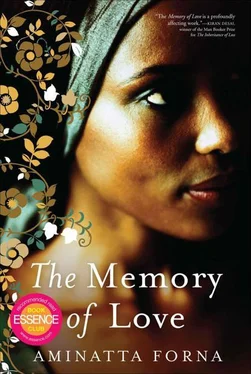I was shown back to the same room, which was empty. No sign of Johnson, of his papers, or my cake.
‘Am I free to go?’ I said.
‘One minute, please.’ My guide trundled off. I waited. A long minute passed. The air in the room was hot now and the smell of sweat was my own. I could have removed my jacket, but I chose not to, for to do so felt like some sort of submission. Neither did I sit down again. I walked about a bit, as much as I could in the confined space. The room was five paces long. Four paces wide. A half-hour must have passed before Johnson reappeared.
At the sight of him I felt a cold gust of anger. I said, ‘Are we through yet?’
‘Oh yes.’ His manner was amiable.
I was in no mood for it. ‘Am I then free to go?’
‘Yes, yes. There are one or two formalities to attend to. Forgive me if I delay you a few minutes further. None of it should take long. You did say you were not teaching today.’ He was amusing himself at my expense. ‘Do sit.’
‘I’m perfectly fine as I am, thank you.’
‘You will be more comfortable if you sit.’
I didn’t move but remained standing in the same spot. Johnson, too, stayed where he was, arms folded in front of him, and watched me. The seconds ticked past. I could hear the sound of rain, a rushing in the distance, ponderous drops from the eaves of the building and from tree branches. I was aware of Johnson’s eyes upon me, regarding me as though I were a querulous child. I felt petulant and aggrieved. My head ached and I experienced a strange and sudden urge to cry. He had even stolen my cake.
Johnson cleared his throat. ‘You will be more comfortable if you sit.’
I was about to decline a second time when I changed my mind, seeing how absurdly I was behaving. I was only delaying my own departure.
‘Fine.’ I walked across the room, seized a chair and dragged it into the middle of the floor. I sat down.
Johnson crossed to the door. ‘Be assured I’ll try not to keep you waiting any longer than necessary, Mr Cole. Just a few minutes.’ He smiled minimally, and as he left the room he turned the key in the lock behind him.
I had been wrong about Johnson. There was nothing civil about him at all.
I waited. Outside the rain eased off, slowing to a distant patter. I listened to the drip, drip of the run-off from the roof. I sat for an hour or so in the failing light until, without warning, the overhead light went on. A switch on the other side of the door. I called out, but nobody answered. A numbness was spreading across my buttocks. The heat had gone from the day and the room seemed suddenly cold. I stood up. I went to the door and banged. I counted to five. I banged again.
Nothing.
‘Is it true,’ says the child Abass, voice juddering as he bounces on the car’s back seat, ‘that the number of stars in the sky is infinity?’
From the driving seat Kai glances back at him. ‘Nobody knows how many stars are in the sky. Nobody knows where the universe ends, so you could say there are an infinite number of stars in the sky. Yes.’
‘How many zeros does infinity have?’
‘A never-ending number.’
‘Never-ending,’ echoes Abass, trying the words out for size, staring from the window as they pass a palm plantation. His eyes switch back and forth from one row to the next, he begins to experiment, closing one eye and then the other.
‘Imagine you tried to drive to the ends of the earth,’ continues Kai. ‘You’d just go round and round, you’d never get to the end of your journey. Think of that as zeros.’
Silence for a while, between the three of them. Adrian can almost hear the whirring cogs of the kid’s imagination. His mind turns to the old man in the room at the hospital and his memories of the moon walk. Adrian had been ten when the moon walk happened. He remembered being in his grandparents’ house, sitting on the rug watching the television across the expanse of the coffee table. His father’s voice explaining what was happening. Calling Adrian to sit by him. His father had been well then.
‘When I was your age,’ says Adrian, then clears his throat. It has been a while since he spoke to a child. Kai has an easy way with Abass, whom he treats as a smaller and more vulnerable version of himself. It’s a matter of hitting the right note. ‘I mean, my father once explained to me how to think of infinity, the only way you could keep the idea in your head.’
‘What did he say?’ Abass comes to lean between the seats; he smells of lemons and soap.
‘He told me to think of a big block of stone a thousand miles long, a thousand miles high, and a thousand miles wide.’
‘That’s a huge block!’
‘A huge block,’ concurs Adrian. ‘OK, now imagine a tiny bird, like a sparrow.’
‘What’s a sparrow?’
‘Well, any tiny bird. Like that one!’ Adrian points at a movement between trees. ‘Now imagine that bird lands on the rock once every thousand years.’
‘Every thousand years?’
‘Yes.’
‘And then imagine it wipes its beak once on one side, and once on the other side. How long do you think it would take for the whole rock to be worn away?’
Abass jumps up and down between the seats. ‘A very, very long time.’
‘Yes. Not quite infinity but very close to.’
‘Yes,’ agrees Abass. ‘Only the bird would die first.’
Kai and Adrian laugh.
The road takes a series of tight turns down through one small village and then another. Here the houses are tall, wooden with narrow windows and shingled roofs, different from the concrete houses of the city and the clay-brick homes in the villages on the road out to Ileana’s place.
‘The first settlements,’ says Kai. ‘There’s a church, too. It’s worth seeing. But we’ll have to come back another time. We’ve a long drive.’
The road dips down along the valley floor and rises again. Here the macadam has disappeared altogether, giving way to rough laterite and in some places huge moguls round which Kai steers the car, a thirty-year-old yellow Mercedes he calls Old Faithful. A white Land Cruiser races past them, kicking up clouds of red dust, briefly wiping out all visibility. At such a moment Adrian might have halted, but Kai drives on unperturbed. The side of the hill rises steeply on one side of them and falls away equally steeply on the other. Here and there, the smooth scars of landslides. On the far side water pours from high up the hillside on to a slope of sheer, dark rock.
‘Look!’ screams Abass, an inch from Adrian’s ear. ‘Waterfall!’
‘Call that a waterfall?’ says Kai. ‘Wait until you see where we’re going.’
‘How long will it take us to get there?’
‘About three hours.’
‘Three hours!?’ He flings himself back against the seat.
‘Don’t worry. It’s worth it. It’ll get faster once we’re on the main road. Do you want to get some cassava bread and fish at Waterloo?’
‘Yes please.’
A bridge, the width of the car. The railings have fallen away, leaving the sides unguarded. Opposite an oncoming vehicle hovers at the entrance to the bridge, waiting for them to make the crossing. Adrian holds his breath as they do so. They have now skirted the city entirely. It lies to the south of them, between the tail of the car and the Atlantic Ocean. Due north is Guinea, three hundred kilometres as the crow flies. Beyond Guinea — Mali, Mauritania, then sand, the Sahara. They pass a settlement of single-storey houses, open scrub, a scattering of rusted equipment and arrive at the junction for the main road. Here the pace shifts gears suddenly. Vehicles sweep past, swerving, overtaking, sometimes stopping abruptly to allow a passenger to descend or pick up another. Kai is silent, giving his concentration to the road.
Читать дальше












